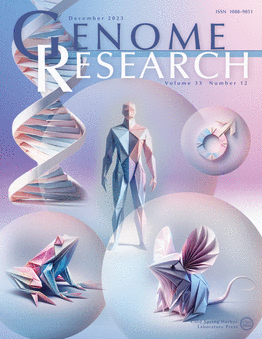人类 TBC1D3 基因家族的独立扩展、选择和高变异性
IF 6.2
2区 生物学
Q1 BIOCHEMISTRY & MOLECULAR BIOLOGY
引用次数: 0
摘要
TBC1D3 是一个灵长类特有的基因家族,它在人类血统中扩展,并与神经元祖细胞的增殖和额叶皮层的扩展有关。该基因家族及其表达一直是研究的难点,因为它包含在高同一性和高度可变的节段重复中。我们利用来自 34 个人类和 11 个非人灵长类物种的长线程测序数据对该基因家族进行了测序和组装。我们的分析表明,这个特殊的基因家族在至少五个灵长类物种中发生了独立的重复,重复的基因位点富集在 17 号染色体上大规模染色体重排的位置。我们发现,人类所有的拷贝数变异都映射到位于染色体 17q12 的两个不同群组上,而且人类在该基因座上的结构变异很大,根据单倍型的不同,拷贝数相差多达 20 个,长度相差约 1 Mbp。我们还显示了正选择的证据,以及预测的人类 TBC1D3 蛋白序列的显著变化。最后,我们发现,尽管存在多个重复,但人类 TBC1D3 的表达仅限于一部分拷贝,而且最明显的是,只来自一个旁系组:TBC1D3-CDKL。这些观察结果可能有助于解释为什么一个可能对大脑皮层发育很重要的基因在人类群体中会如此多变。本文章由计算机程序翻译,如有差异,请以英文原文为准。
Independent expansion, selection and hypervariability of the TBC1D3 gene family in humans
TBC1D3 is a primate-specific gene family that has expanded in the human lineage and has been implicated in neuronal progenitor proliferation and expansion of the frontal cortex. The gene family and its expression have been challenging to investigate because it is embedded in high-identity and highly variable segmental duplications. We sequenced and assembled the gene family using long-read sequencing data from 34 humans and 11 non-human primate species. Our analysis shows that this particular gene family has independently duplicated in at least five primate lineages, and the duplicated loci are enriched at sites of large-scale chromosomal rearrangements on Chromosome 17. We find that all human copy number variation maps to two distinct clusters located at Chromosome 17q12 and that humans are highly structurally variable at this locus, differing by as many as 20 copies and ~1 Mbp in length depending on haplotypes. We also show evidence of positive selection, as well as a significant change in the predicted human TBC1D3 protein sequence. Lastly, we find that, despite multiple duplications, human TBC1D3 expression is limited to a subset of copies and, most notably, from a single paralog group: TBC1D3-CDKL. These observations may help explain why a gene potentially important in cortical development can be so variable in the human population.
求助全文
通过发布文献求助,成功后即可免费获取论文全文。
去求助
来源期刊

Genome research
生物-生化与分子生物学
CiteScore
12.40
自引率
1.40%
发文量
140
审稿时长
6 months
期刊介绍:
Launched in 1995, Genome Research is an international, continuously published, peer-reviewed journal that focuses on research that provides novel insights into the genome biology of all organisms, including advances in genomic medicine.
Among the topics considered by the journal are genome structure and function, comparative genomics, molecular evolution, genome-scale quantitative and population genetics, proteomics, epigenomics, and systems biology. The journal also features exciting gene discoveries and reports of cutting-edge computational biology and high-throughput methodologies.
New data in these areas are published as research papers, or methods and resource reports that provide novel information on technologies or tools that will be of interest to a broad readership. Complete data sets are presented electronically on the journal''s web site where appropriate. The journal also provides Reviews, Perspectives, and Insight/Outlook articles, which present commentary on the latest advances published both here and elsewhere, placing such progress in its broader biological context.
 求助内容:
求助内容: 应助结果提醒方式:
应助结果提醒方式:


